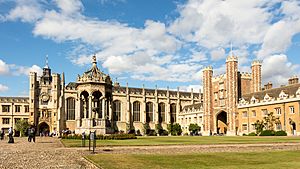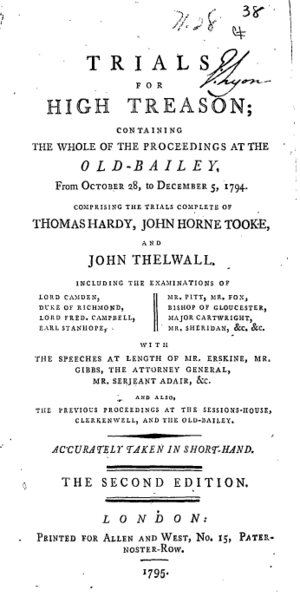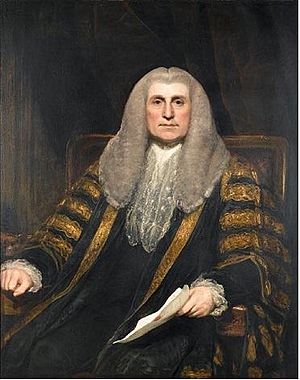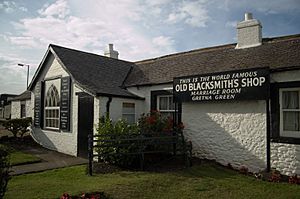Thomas Erskine, 1st Baron Erskine facts for kids
Quick facts for kids
The Lord Erskine
|
|
|---|---|
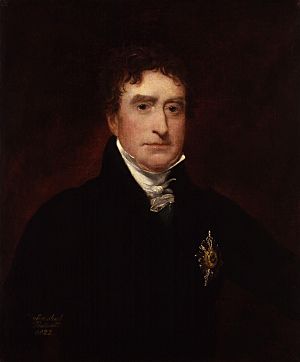
Portrait by William Charles Ross
|
|
| Lord High Chancellor of Great Britain Lord High Steward for the trial of: |
|
| In office 7 February 1806 – 1 April 1807 |
|
| Monarch | George III |
| Prime Minister | The Lord Grenville |
| Preceded by | The Lord Eldon |
| Succeeded by | The Lord Eldon |
| Member of Parliament for Portsmouth |
|
| In office 1790–1806 |
|
| Preceded by | William Cornwallis |
| Succeeded by | David Montagu Erskine |
| Personal details | |
| Born | 10 January 1750 Edinburgh, Scotland |
| Died | 17 November 1823 (aged 73) Almondell, Linlithgowshire, Scotland |
| Nationality | British |
| Political party | Whig |
| Spouses | (1) Frances Moore (d. 1805) (2) Sarah Buck (d. 1856) |
| Alma mater | Trinity College, Cambridge |
Thomas Erskine, 1st Baron Erskine (born January 10, 1750 – died November 17, 1823) was a famous British lawyer and politician. He was a member of the Whig political party. From 1806 to 1807, he held a very important job called Lord High Chancellor of Great Britain. This role is like the chief judge and legal advisor to the government.
Contents
Early Life and Family Background
Thomas Erskine was born in Edinburgh, Scotland. He was the youngest of three sons. His family was noble, but they were not rich. His mother taught him and his brothers a lot at home.
When Thomas was young, his family moved to St Andrews to save money. He went to grammar school there. However, his family spent most of their money on his older brothers' education. So, at age 14, Thomas had to stop school.
Thomas Erskine decided to join the Navy as a midshipman. He sailed to the Caribbean and spent four years there. He even became an acting lieutenant. But when he was 18, he left the Navy because there were no higher positions for him.
With a small amount of money, he bought a position in the army. He became an ensign in the 1st (Royal) Regiment of Foot. He was stationed in places like Berwick-upon-Tweed and Minorca. While in the army, he sometimes gave speeches to his men. This showed his talent for speaking, which would be very important later in his life. He also wrote about improving the army.
In London, he met famous writers like Samuel Johnson. People noticed how well he spoke and how smart he was. Even though he was promoted to lieutenant, he decided to leave the army. With encouragement from his family, he chose to study law.
Becoming a Lawyer
In 1775, Thomas Erskine began studying law. He learned that if he had a university degree, he could become a lawyer faster. So, he enrolled at Trinity College, Cambridge. As the son of an earl, he didn't have to take exams to get his degree. However, he did win a prize for a speech about the "glorious revolution" of 1688.
During this time, Thomas and his growing family were quite poor. He lived on a small gift from a relative and money from selling his army position. One person described him as "shabbily dressed."
In 1778, Erskine became a lawyer. Unlike many new lawyers, he became successful very quickly. His first big case was defending Captain Thomas Baillie. Baillie had exposed problems at a hospital for sailors and was being sued. Erskine, who had been a sailor himself, took the case. He gave a brilliant speech that helped Baillie win. Erskine even bravely criticized a powerful lord during the trial.
After this success, Erskine had many cases. He defended Admiral Augustus Keppel in a court-martial, and Keppel was found innocent. Erskine earned a lot of money and became financially secure.
Important Legal Cases
In 1781, Erskine defended Lord George Gordon, who was accused of treason for causing riots. Erskine's defense helped Gordon be found not guilty. This case also changed how the law defined "treason." By 1783, Erskine was one of the most successful lawyers in the country. He bought a country house and a house in London.
In 1783, Erskine became a Member of Parliament for Portsmouth. He was part of the Whig party. However, his speeches in Parliament were not as impactful as his speeches in court. He lost his seat the next year but got it back in 1790.
His legal career continued to shine. In 1786, he successfully defended William Davies Shipley, who was accused of publishing a critical pamphlet. Erskine argued that a jury, not just a judge, should decide if something is libel (a harmful false statement). This idea later became law.
In 1789, he defended a bookseller named John Stockdale. Stockdale was accused of libel for publishing a pamphlet supporting a politician. Erskine argued that if a writing, taken as a whole, was a fair discussion, it shouldn't be considered libel, even if some parts seemed problematic. Stockdale was found not guilty.
Three years later, Erskine defended Thomas Paine, who wrote Rights of Man. Paine was accused of libel for criticizing the government. Erskine argued that people have the right to criticize and change their government. He also said that a free press makes a government more secure. Even though Paine was found guilty, Erskine's speech is remembered for his strong belief that lawyers must defend everyone, even those with unpopular views. Because he defended Paine, Erskine lost his job as a legal advisor to the Prince of Wales.
In 1794, the government was worried about a revolution. They arrested many people who wanted to reform Parliament and accused them of treason. Erskine defended seven of these people for free. The trials began with Thomas Hardy. After many days of evidence and speeches, including Erskine's seven-hour speech, the jury found Hardy not guilty. Crowds cheered Erskine as a hero. The government tried two more people, but Erskine also helped them get acquitted. Because of Erskine's work, the government had to stop prosecuting many others.
Another famous case was that of James Hadfield. Hadfield was a former soldier who shot at the king. Erskine argued that Hadfield was insane because of head injuries from battle. He convinced the judge that Hadfield's actions were caused by his illness. Hadfield was found not guilty and was detained. This case led to new laws about people who commit crimes due to insanity.
Lord Chancellor and Retirement
In 1806, Thomas Erskine was offered the job of Lord Chancellor. This is one of the highest legal positions in Britain. He became a peer, which means he was given the title Baron Erskine. His motto, "trial by jury," showed his strong belief in fair trials.
Even though he didn't have much experience in this specific area of law, his decisions as Lord Chancellor were very good. He held the position for only 14 months. He had to resign when the government he was part of disagreed with the king about allowing Catholics more rights.
After leaving office, Erskine could not return to being a lawyer. He received a pension of £4000 a year and remained a member of the House of Lords. He was only 57, but he mostly retired from public life.
In 1818, he married for a second time to Sarah Buck. They had already had four children together. Their marriage was sometimes difficult and they later separated. Despite earning a lot of money as a lawyer, Erskine faced financial problems in his later years. He had to sell his home and move.
In his retirement, Erskine became a strong supporter of animal rights. He loved animals and had a dog, a macaw, a goose, and even two leeches as pets! He introduced a bill in the House of Lords to prevent cruelty to animals. He argued that humans should treat animals kindly. This bill was passed into law.
He also spoke out in defense of Queen Caroline when the government tried to divorce her from the king. He was happy when the government dropped the divorce bill, saying that the "sacred rule of Law" had been restored.
Thomas Erskine died on November 17, 1823, at the age of 73. He was buried in his family's burial place in Scotland.
Family Life
Thomas Erskine married Frances Moore in 1770, even though her father didn't approve. Frances was described as a very loyal and loving woman. They had four sons and three daughters:
- David Montagu Erskine (1776–1855) became a Member of Parliament and a diplomat.
- Henry David (1786–1859) became a church leader.
- Thomas (1788–1864) became a judge.
- Esmé Steuart (1789–1817) fought in the Battle of Waterloo and lost an arm.
- Frances (died 1859) married Samuel Holland.
- Elizabeth (died 1800) married her cousin.
- Mary (1784-1804) married lawyer Edward Morris.
With his second wife, Sarah Buck, Thomas Erskine had four more children:
- Erskine Thomas (1809–1893) was an army officer who moved to New Zealand.
- Alfred (1810–1830) died young.
- Agnes Sarah Steuart (1812–1883) also moved to New Zealand.
- John Hampden (1817–1837) died from tuberculosis.
Thomas Erskine's family line continued to be important. Later, one of his great-great-great-grandsons became the Earl of Buchan, a title held by Thomas's older brother.
|
 | Bayard Rustin |
 | Jeannette Carter |
 | Jeremiah A. Brown |


